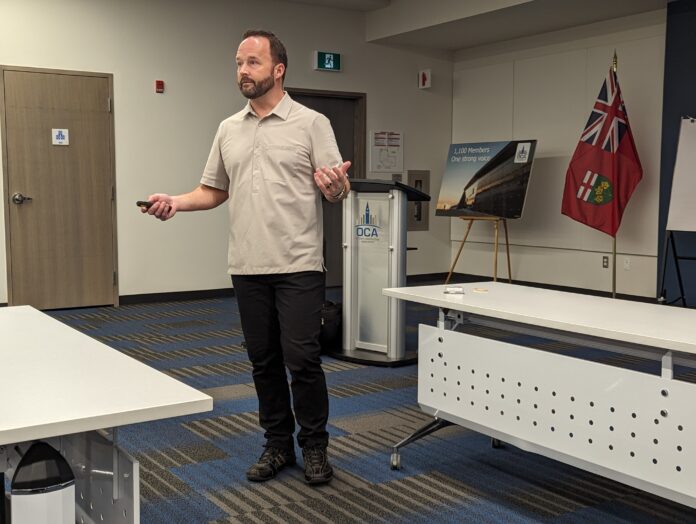Ottawa Construction News staff writer
How serious are mental health and substance abuse issues within Ontario’s construction industry?
Three speakers at an Ottawa Regional Labour/Management Health and Safety Committee mental health seminar last Wednesday (Nov. 8) indicated the challenges are far more severe than they appear on the surface, in part because of the stigma associated with mental health issues.
They said individuals and organizations are afraid to acknowledge they have a problem, and when it surfaces, the quick-fix, which can include brushing off the problem at one level, or at another, abrupt dismissal from the job site, makes things worse.
The challenges are severe, with upwards of one in three opioid deaths from people in the workforce coming from the construction industry, said pharmacist Mark Barnes, whose RespectRX locations in Ottawa dispense opioid antidotes and provide services to individuals caught in the addition trap.
The stereotypical opioid victim as a homeless person living on the street doesn’t reflect the actual situation, Barnes said. Most individuals with a substance abuse problem are working (largely in construction) and have a home. And, he said, many don’t even know they are consuming the deadly drugs, which are mixed often with other recreational drug.
Most opioid deaths happen away from work. “Less than two per cent of the deaths that happen are on the job site,” he said. “Ninety-eight percent of the people who die in this industry of an opioid overdose, it’s after work on payday.”
The tradesperson may have worked many hours and has a “big fat paycheck” in his pocket (almost all victims are male), and perhaps is experiencing pain from workplace stress and injuries. So he consumes some drugs, perhaps shared by fellow workers, where a small amount of fentanyl or another substance is included in the mix – and with low tolerance to the drug, overdoses happen, “four out of five times their own homes.”
These “alone” drug deaths are problematic because the drug user in the midst of an overdose won’t be able to self-administer the best available antidote – Naloxone – which works within minutes to temporarily block the opioid’s slowing down of respiration and cardiac activity.
Despite the problem with at-home overdoses, Barnes is encouraging contractors to keep enough Naloxone kits on the job site. They are often helpful when someone nearby off-site is overdosing.
Under provincial rules, Naloxone kits are supposed to be freely available at pharmacies without any requirement that the person requesting the antidote to identify himself. However, the anti-opioid treatment can only be dispensed individually – in other words, a contractor’s safety representative could only obtain free kits for his own use.
(Barnes got around that problem by bringing a large sack of Naloxone kits to the meeting, making them freely available to the approximately 30 attendees, who could take them away as individuals.)
A big problem with Naloxone kits and other opioid and mental health issues, however, is the stigma and implications that mental health and drug issues are moral rather than health challenges.
Workers are afraid to self-report problems, and when they are revealed, the responses are often unsympathetic or harmful, including immediate dismissal from the job.
Stuart Simpson, vice-president at SMART Local 47 in Ottawa, outlined how unions and employers can work together to improve awareness and responsiveness to mental health challenges.
He said the Provincial Building and Construction Trades Council of Ontario has developed a training program specifically designed for “union educators to deliver to union members, apprentices, officers, and other building trades union representatives.”
In a handout he provided, Simpson outlined how the six-hour program participants will:
- have a greater understanding of the signs and symptoms of depression and anxiety;
- be confident to approach a worker they may be concerned about and initiate a conversation;
- understand potential mental health risks and protective factors in the workplace and how these may impact on workers;
- know what support and resources are available to workers; and
- be able to deliver informal ‘toolbox talks to workers about mental health and wellness in the construction workplace.
Separate programs provide resources about how to respond effectively when an opioid poisoning problem occurs, and how to deal with discrimination and harassment in the workplace.
The third speaker, David Hedley, mental health counsellor at the Ottawa Building Trades Members Assistance Program, made clear the relationships between mental health issues, “substance use disorder”, and the construction trades.
As an example of the problem’s severity, he cited a US study from the Centres for Disease Control and Prevention (CDC) that discovered the suicide rate for “men in construction and extraction in 2018 was five times greater than the rate of all other work-related fatalities.”
Challenges are especially severe for young construction workers, who might at age 18 and working as an apprentice, have far more money than their peers attending post secondary institutions – but not the maturity or experience to manage emotional difficulties or drug use issues.
Suicide rates are high in the trades because of the stigma associated with mental health problems such as depression, and because men won’t seek out help.
Accordingly, there’s a great need for people working at job sites to be able to recognize potential problems, provide a listening ear, and guide their colleague with mental health issues to appropriate resources for counselling and support.
“We need to be able to say ‘Hey, are you doing okay? I’ve noticed, I’ve heard from the place where your are working you’re missing a lot of time at work . . .’”
“The first thing is just reaching out,” Hedley said.








